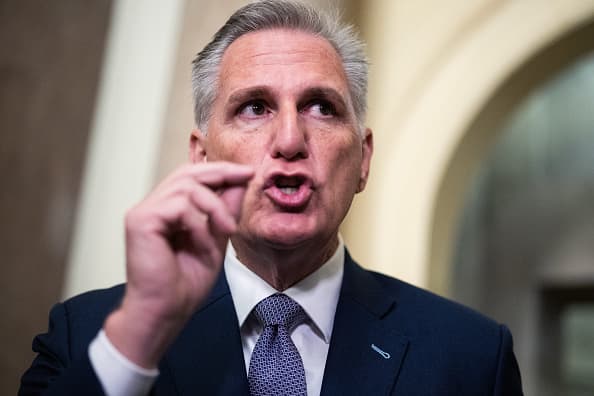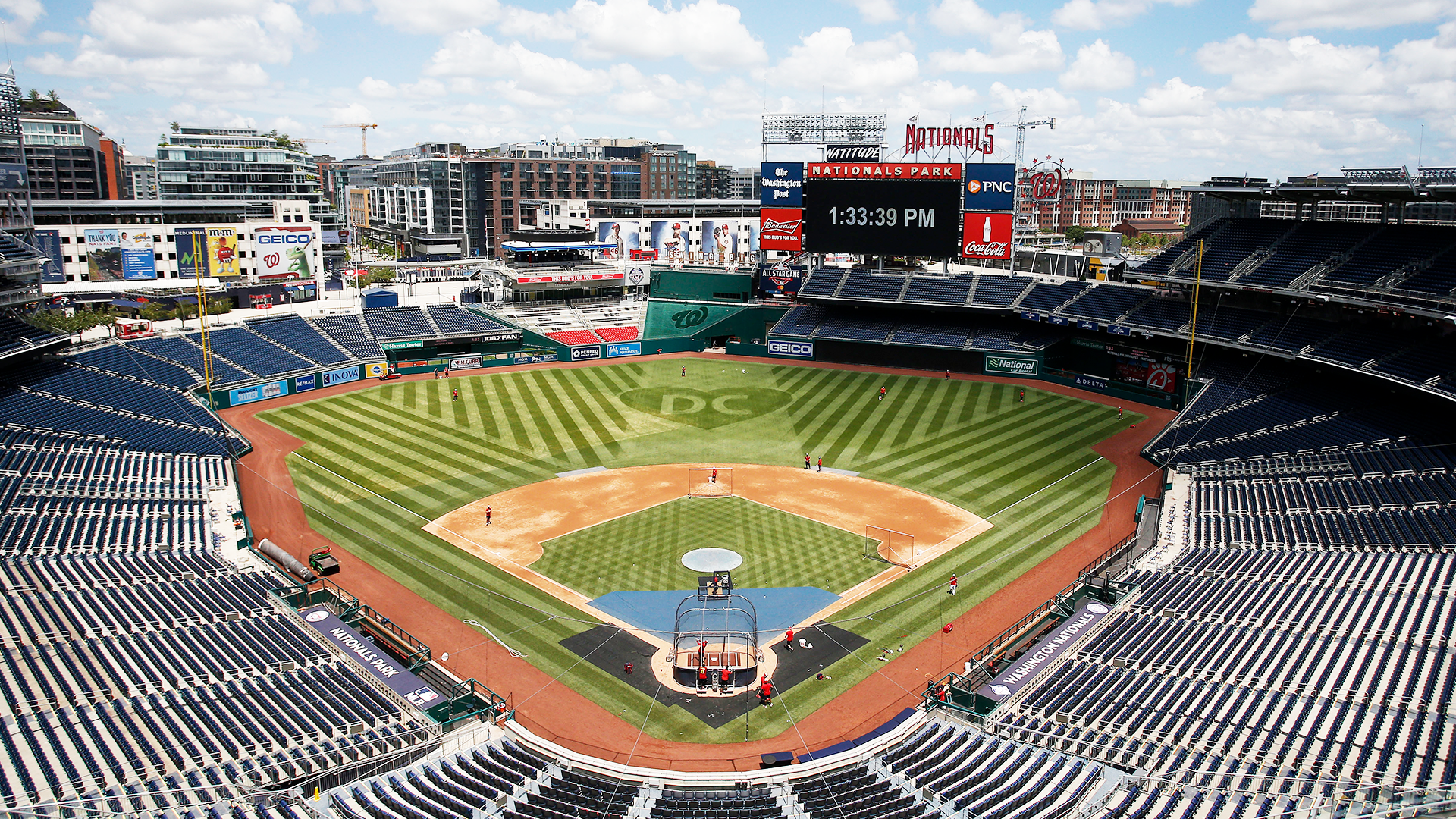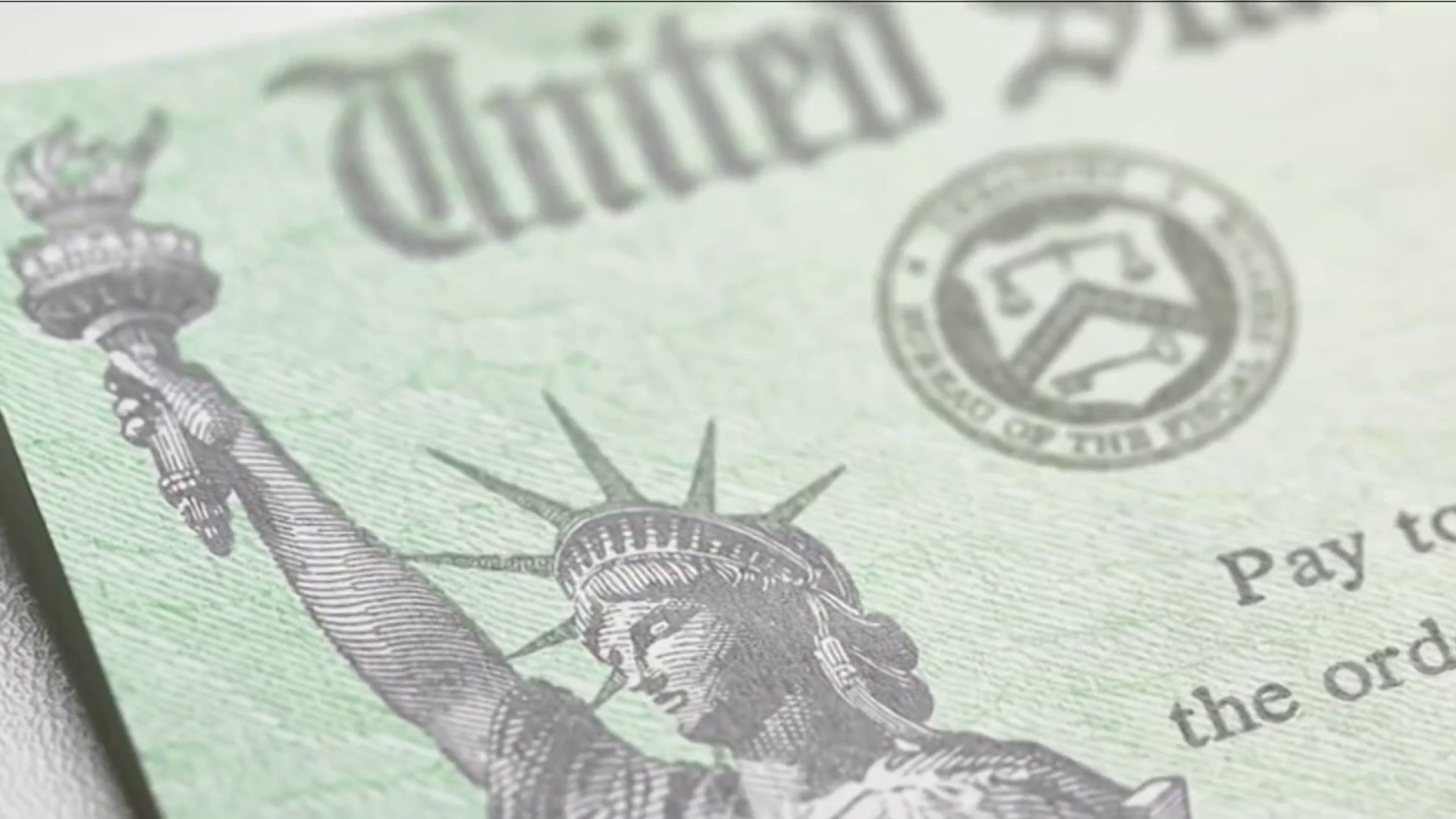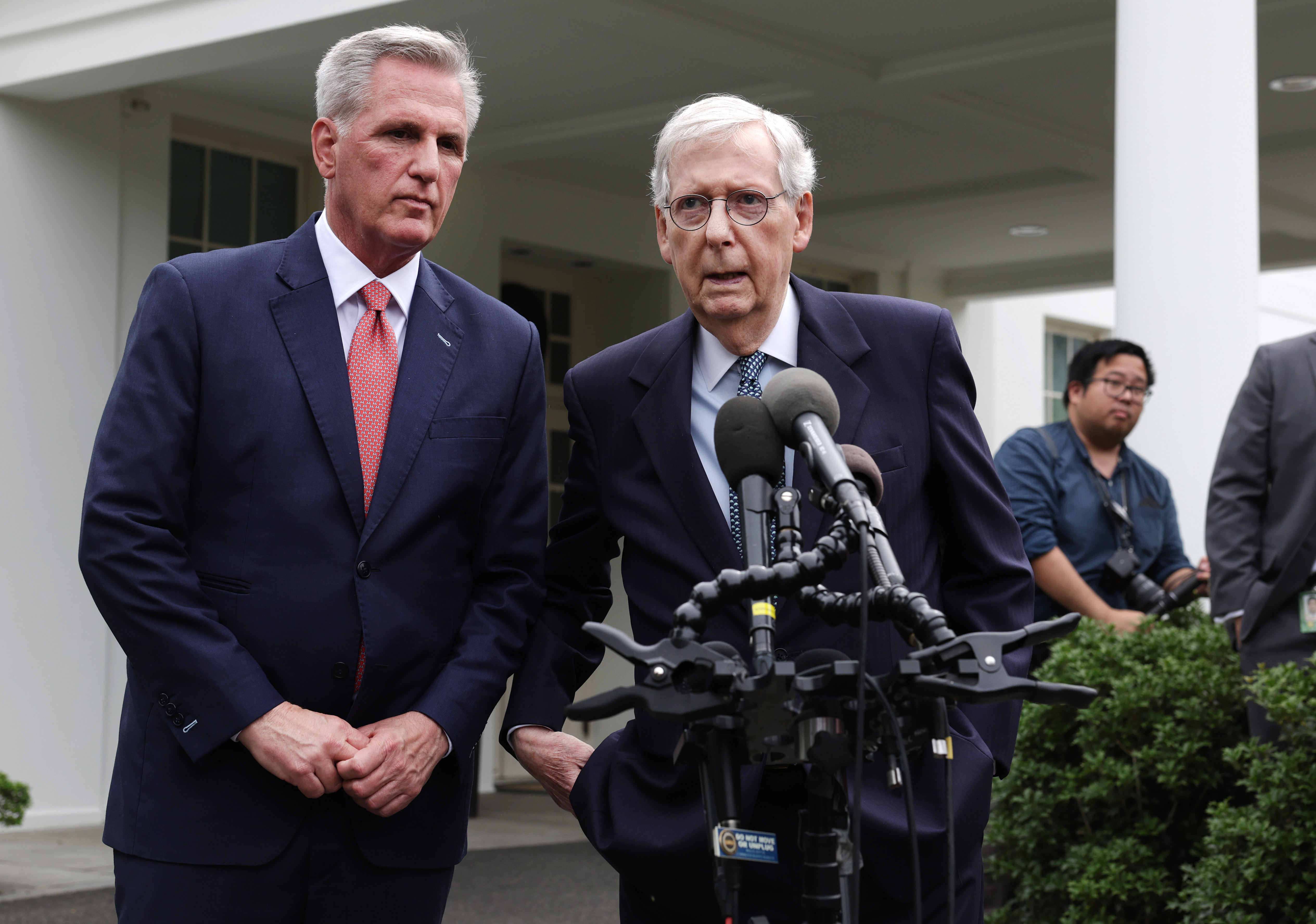The federal government could shut down within days if Congress doesn’t come to an agreement to fund agencies by this week’s deadline.
A last-minute bipartisan vote in the U.S. House agreed on a 45-day funding plan, but with just hours for that plan to pass the Senate, it's still not clear whether a shut down will take place.
The effects of a government shutdown would be felt around the country. Nearly 2 million civilian federal workers — 15% of whom are based in the D.C. area — and another 2 million military workers would face delays in getting their paychecks.
Not getting paid will be devastating for many federal workers and their families, said Everett Kelley, the president of the American Federation of Government Employees.
We're making it easier for you to find stories that matter with our new newsletter — The 4Front. Sign up here and get news that is important for you to your inbox.
“Some of them are going to go hungry without a paycheck. Some of them are going to miss a house note without a paycheck. Some of them are not going to be able to pay child care,” said Kelley, who represents more than 700,000 workers across the country..
When the government shut down for 34 days in late 2018 and early 2019, federal workers lined up at food banks.
The prospect of a shutdown also concerns thousands of federal contractors and people whose work is connected to the federal government, such as those who work for restaurants, food trucks and in tourism.
A shutdown would likely lead to event cancelations. The National Celebration of Hip-Hop, originally set for Oct. 6 and 7 on the National Mall, was relocated and postponed due to shutdown concerns.
Here are answers to some of the most-asked questions about the possible 2023 government shutdown.
When would the government shut down?
The deadline to fund the government is Saturday, Sept. 30, 2023. Without a funding plan, a shutdown would take effect at 12:01 a.m. on Sunday, Oct. 1, 2023.
It’s unclear how long a government shutdown could last. It all depends on how quickly Congress can pass funding bills.
Why would the government shut down?
A shutdown happens when Congress fails to pass some type of funding legislation that is signed into law by the president.
Lawmakers are supposed to pass 12 different spending bills to fund agencies across the government, but the process is time-consuming. They often resort to passing a temporary extension, called a continuing resolution or CR, to allow the government to keep operating.
House Speaker Kevin McCarthy, R-Calif., can't afford to lose more than four Republican votes on a spending bill. With Republican votes at a premium, the House Freedom Caucus, which boasted 49 members in January, has stalled budget negotiations by adopting a hard stance on domestic spending cuts, CNBC reported.
McCarthy could seek help from Democrats to secure votes to avoid a shutdown, but that could put his speakership at risk.
What happens during a government shutdown?
Many government functions would be severely curtailed. Social Security checks would still go out, but federal agencies would stop all actions deemed non-essential.
Millions of federal employees, including members of the military, would not receive paychecks. Nearly 60% of federal workers are stationed in the departments of Defense, Veterans Affairs and Homeland Security.
Federal workers are stationed in all 50 states and have direct interaction with taxpayers — from Transportation Security Administration agents who operate security at airports to Postal Service workers who deliver mail. Some federal offices will also have to close or face shortened hours during a shutdown. Employees deemed essential, such as air traffic controllers and law enforcement officers, still would have to report to work.
John Hubert, an airport security officer in Fort Lauderdale, Florida, recalls helping fellow Transportation Security Administration workers get essentials from food banks when they worked without pay during the last government shutdown. By the end of the 35-day ordeal, he needed the same help himself.
“Just like other Americans, we've still got to pay our bills, regardless of what’s going on with Congress,” he said. “Officers with children, single parents are going to be dramatically affected if a shutdown continues over a long period of time.”
Across the country, federal workers still stung by the memories of past government shutdowns are grimacing and bracing for another potential extended closure. It's a test not only of their ability to stay financially afloat, but also of their commitment to public service.
At Reagan National Airport, a union president said she fears the shutdown poses a safety risk affecting Transportation Security Administration workers.
“I honestly believe it will be a public safety issue to work without a paycheck. High stress. It would affect the workers mentally,” said Alicia Dolforde, AFGE president of Local 1442. She represents nearly 700 TSA workers at the airport.
Government services: People applying for government services like clinical trials, firearm permits and passports could see delays.
Museums and the National Zoo: If the federal government shuts down, Smithsonian museums and the National Zoo will stay open, at least initially. The Smithsonian will use “prior-year funds” to keep museums and the zoo open to the public at least through Oct. 7, officials said in a statement Friday.
WIC and SNAP assistance: Nearly 7 million women and children who rely on the Special Supplemental Nutrition Program for Women, Infants, and Children (WIC) could be at risk of losing assistance almost immediately into a shutdown, according to the Biden administration. That's because the federal contingency fund supporting normal WIC operations will likely run out in a matter of days — pushing states to rely on their own money or carryover funds.
Impacted families are “going to be going to food pantries,” said Dr. Nancy Nielsen, senior associate dean for health policy at the University at Buffalo’s Jacobs School of Medicine & Biomedical Sciences. “These are people who need the help. These are moms. These are infants. So this is a real problem.”
Families who receive benefits from the Supplemental Nutrition Assistance Program could also lose assistance if a shutdown drags out for a more significant period of time. According to the Agriculture Department, regardless of what happens in Washington this weekend, households will receive SNAP assistance as usual through October.
Head Start and free school lunches: Head Start programs serving more than 10,000 disadvantaged children would immediately lose federal funding, although they might be able to stave off immediate closure if the shutdown doesn’t last long.
Those 10 programs, which are located in Alabama, Connecticut, Florida, Georgia, Massachusetts and South Carolina, serve just a fraction of the 820,000 children enrolled in the program at any given time.
Tommy Sheridan, the deputy director for the National Head Start Association, said the programs are in trouble because their grants start on Oct. 1. Programs with grants that don’t start on that date will continue getting money. But if the shutdown drags on, the number of affected programs will grow as more grants come up for renewal.
Beyond Head Start, concerns have also arisen around free school meals. But the Agriculture Department says it does not anticipate any immediate issues with federal child nutrition programs, including school meals because support for these programs is provided in part by a permanent and mandatory funding authority.
In the event of a government shutdown, state and federal operations for child nutrition are set to continue through October and potentially a few months beyond that, according to the department. But the department would not be able to support these programs for the full year without appropriations.
Social Security and SSI: Social Security and Supplemental Security Income recipients will continue to receive payments. But response times for people with issues could be delayed due to furloughs.
“If you have a question about Social Security, you may not be able to find anybody to answer your questions,” Nielsen said. “But the everyday transactions of sending checks out will still continue.”
According to a recent contingency plan from the Social Security Administration, the agency will cease non-critical actions and those "not directly related to the accurate and timely payment of benefits.” The issuance of new social security cards and replacements will continue.
Student loans: If spending measures aren’t passed by Saturday’s deadline, the government shutdown would start the same day that student loans emerge from the pandemic pause after beginning to accrue interest again on Sept. 1.
But, shutdown or not, borrowers’ payments will still be due. For the most part, loan servicers will be able to continue to process payments regularly — but there could be delays for those who need to consult with or seek help from the Education Department due to the potential of agency furloughs.
Students applying for federal aid during a shutdown can expect similar delays because of this. Officials have pointed to potential disruptions to processing FAFSA applications, disbursing Pell Grants and pursuing public loan forgiveness, for example.
Medicare and Medicaid: Medicare and Medicaid benefits will also continue — as both are mandatory programs funded separately from annual appropriations. That means that patients should still be able to see their doctors and have medical bills paid.
But, similar to Social Security, there could be delays and disruptions to customer service due to furloughs. According to contingency details published by the Health and Human Services Department last week, about half of the Centers for Medicare and Medicaid Services is set to be furloughed in the event of a lapse of appropriations.
Beyond Medicare and Medicaid, health care services for veterans are set to continue in the event of a shutdown. The majority of programs funded by the Indian Health Service would also remain in operation and IHS has received advanced appropriations for the 2024 fiscal year, per a recent contingency plan.
Mail service: The United States Postal Service will not be affected by a government shutdown. The Postal Service doesn't rely on taxpayer dollars because it generally gets its funding through the sales of products and services.
The economy: Lawmakers also warn that a shutdown could rattle financial markets. Goldman Sachs has estimated that a shutdown would reduce economic growth by 0.2% every week it lasted, but growth would then bounce back after the government reopens.
Others say the disruption in government services has far-reaching impacts because it shakes confidence in the government to fulfill its basic duties. The U.S. Chamber of Commerce warned, “A well-functioning economy requires a functioning government.”
Air travel: The nation’s air-travel system is expected to operate relatively normally during a shutdown. Air traffic controllers and TSA screeners are deemed essential workers — however, those people won’t be paid until the shutdown ends, and TSA lines could grow longer if enough screeners stay home.
Transportation Secretary Pete Buttigieg said Wednesday that air travel will remain safe in a shutdown, but that the training of new air traffic controllers will stop and 1,000 trainees will be furloughed.
Long before this week's deadline, airlines were already been complaining that a shortage of air traffic controllers has been causing flight delays and cancellations. The Federal Aviation Administration said in August it hired 1,500 new controllers in the past year and asked Congress for money to hire another 1,800 in the new fiscal year.
The travel sector could lose $140 million daily in a shutdown, according to the U.S. Travel Industry Association.
Passports and visas: The processing of passports and visas will continue in a shutdown “as the situation permits,” according to guidance that the State Department gave employees last week. The department said consulates in the U.S. and abroad will say open “as long as there are sufficient fees to support operations,” but passport work could stop if the building where the work is done gets shuttered.
The time it takes to get a passport or visa already is much longer than before the pandemic. Most Customs and Border Protection agents are also considered essential and would be expected to work at airports and border crossings.
The president, Congress and the judiciary: The president and members of Congress will continue to work and get paid. However, any members of their staff who are not deemed essential will be furloughed.
The Supreme Court, which begins its new term Monday, would be unaffected by a short shutdown because it can draw on a pot of money provided by court fees, including charges for filing lawsuits and other documents, court spokeswoman Patricia McCabe said.
The rest of the federal judiciary also would operate normally for at least the first two weeks of October, said Peter Kaplan, a spokesman for the judiciary.
Even in a longer shutdown, the entire judiciary would not shut down, and decisions about what activities would continue would be made by each court around the country. The justices and all federal judges would continue to be paid because of the constitutional prohibition on reducing judges’ pay during their tenure, according to the Congressional Research Service.
Federally funded agencies that are not under the District's control do "provide critical criminal and civil justice services to the District," Del. Eleanor Holmes Norton said. They have been "adversely affected by federal government shutdowns, including canceled services and furloughed employees."
Norton introduced a bill on Sept. 18 that would exempt these agencies from federal government shutdowns: Court Services and Offender Supervision Agency for D.C., D.C. Courts, D.C. Public Defender Service, D.C. Commission on Judicial Disabilities and Tenure, D.C. Judicial Nomination Commission and D.C. Criminal Justice Coordinating Council.
Metro: No major changes are planned for Metro service, Clarke said, but some changes could be made based on data from stations. For example, some Metro entrances could be closed in cases where not enough riders are coming through.
A lot of riders are federal workers. Ridership and fare payments could fall just as the transit agency is gaining riders back as it rebounds from COVID.
“Hopefully, this will not happen and if it does it will be very short. But certainly not a good time for Metro to have a federal government shutdown,” Metro General Manager Randy Clarke said.
Other transit systems, including VRE, say they’re also weighing how they would respond to a shutdown.
Special counsels: Notably, funding for the three special counsels appointed by Attorney General Merrick Garland would not be affected by a government shutdown because they are paid for through a permanent, indefinite appropriation, an area that’s been exempted from shutdowns in the past.
That means the two federal cases against Donald Trump, the former president, as well as the case against Hunter Biden, the son of President Joe Biden, would not be interrupted. Trump has demanded that Republicans defund the prosecutions against him as a condition of funding the government, declaring it their “last chance” to act.
Tourism: Businesses closely connected to the federal government, such as tourist services around national parks, could see disruptions and downturns. The travel sector could lose $140 million daily in a shutdown, according to the U.S. Travel Industry Association.
World Culture Festival: The Friday and Saturday plans for the World Culture Festival will continue as normal. After organizers announced Sunday's festivities would be livestreamed "from a private venue" in D.C., Mayor Muriel Bowser said the D.C. government would step in to take over any duties the National Park Service cannot perform, so that Sunday's schedule for the festival can proceed as planned.
During the last government shutdown in late 2018 and early 2019, a long list of D.C. institutions closed, including:
- Smithsonian museums
- The National Zoo
- The National Gallery of Art
- The National Archives
- Ford’s Theatre
- The White House Visitor Center
Do federal employees get paid during a shutdown?
When no funding legislation is enacted, federal agencies have to stop all nonessential work and will not send paychecks as long as the shutdown lasts.
Although employees deemed essential such as air traffic controllers and law enforcement officers still have to report to work, other federal employees are furloughed. But their paychecks will not show up until after a funding deal is struck. Under a 2019 law, those same workers are slated to receive backpay once the funding impasse is resolved.
However, after the lengthy shutdown that began in 2018, it took a long time for those checks to come, according to Alicia Dolforde, who represents hundreds of TSA workers at Reagan National Airport.
"It was very stressful. It was high-stress. We were sent a letter home for creditors, to give to our creditors," Dolforde said. It took over two months."
Will the government shut down?
That's the multi-billion-dollar question.
Members of Congress are still working to put together bills to fund the government. Shutdowns have been averted days before the deadline in the past.
Saturday afternoon saw the House pass a 45-day funding plan in a surprise bipartisan vote. The plan drops aid to Ukraine, but increases federal disaster assistance and would keep federal agencies running. As of 3:30 p.m., that plan still needs to be approved in the Senate.
While the federal and local D.C. governments are preparing for a shutdown, there are several likely scenarios at play, according to NBC’s Meet the Press:
- Congress doesn’t pass any deal and the government shuts down after Sept. 30.
- Congress passes one or more continuing resolutions (often called a “CR”) that provide temporary stop-gap funding.
- Congress passes 12 appropriations bills to fund the government for another year, averting a shutdown.
- Congress passes some appropriations bills by the deadline, but not others, potentially leading to a partial government shutdown.
How likely is a government shutdown in 2023?
A federal shutdown after Sept. 30 seems all but certain unless Speaker McCarthy can persuade his rebellious hard-right flank of Republicans to allow Congress to approve a temporary funding measure to prevent closures as talks continue.
Even if the House is able to complete its work this week on some bills, which is highly uncertain, they would still need to be merged with similar legislation from the Senate, another lengthy process, the AP reported.
The Senate earlier this week introduced a bill that would keep the government open through Nov. 17, giving lawmakers more time to reach a deal on a larger budget plan. McCarthy criticized the measure but said he's hopeful a deal will be reached.
What’s a furlough and who is affected by a government shutdown?
"A furlough is the placing of an employee in a temporary nonduty, nonpay status because of lack of work or funds, or other nondisciplinary reasons," the Office of Personnel Management (OPM) says in its Guidance for Shutdown Furloughs.
When workers are put on leave because there isn't money budgeted for their job, they're on what's called shutdown furlough. Those employees won't get paychecks during the shutdown. Federal employees can expect to get backpay once the government reopens.
Employees who are "excepted" may continue to work — but their pay may be delayed. Excepted employees "are performing tasks that, by law, are allowed to continue during a lapse in appropriations," OPM said. Examples include tasks related to protecting human life or property.
Employees who are "exempt from furlough" are those whose jobs aren't funded by annual appropriations. "Employees performing those functions will generally continue to be governed by the normal pay, leave, and other civil service rules."
Contractors who work with the federal government could also be affected: They might be barred from accessing closed government facilities or unable to get direction from agencies they're working with, Washington Business Journal reported. Federal agencies wouldn't be able to award to modify contracts. Late payments, stopped work and other challenges could lead to contractors getting furloughed, and layoffs aren't out of the question.
Contractors are not guaranteed back pay like workers employed directly by the federal government are, the journal said.
How can federal workers collect unemployment?
Most federal workers and contractors will be eligible for unemployment.
The most important thing to know about unemployment is that you file in the jurisdiction where you work, not where you live. Even if you’ve worked from home since the pandemic hit, you file where your office is located. That means most people in the D.C. area will file in D.C., even if they live in Maryland or Virginia.
The director of D.C. Department of Employment Services, Unique Morris-Hughes, recommended visiting the department’s website now.
“The day you're eligible to apply is the day the government shuts down, and when the government is officially unfunded, that's when people can start submitting unemployment insurance applications. To prepare in advance of this, I recommend visiting the website, checking the eligibility criteria,” she said.
Benefits vary by jurisdiction. The maximum weekly benefits are $444 in D.C., $430 in Maryland and $378 in Virginia.
The D.C. Department of Employment Services is preparing to receive what’s likely to be a tidal wave of unemployment applications, the director said. They’re seeking to avoid problems seen during the height of the pandemic.
“We’ve learned a whole lot of lessons since the pandemic, and, let me tell you, the District of Columbia is prepared and ready for a potential government shutdown. We have staff, we have call center staff that's ready to go,” she said.
When was the last government shutdown?
The last government shutdown ran from Dec. 21, 2018, to Jan. 25, 2019. At 34 days, it was the longest government shutdown in United States history.
In the first 25 days of 2019, the D.C. economy lost about $1.6 billion in economic activity due to the shutdown, a George Mason University economist told WAMU. A large portion of that would eventually be paid out in checks to federal workers, but other losses, such as restaurants that missed out on selling food, couldn't be recouped.
CNBC contributed to this report.





